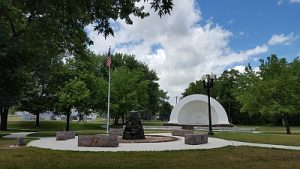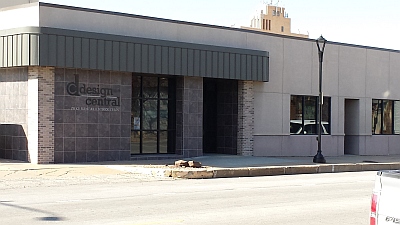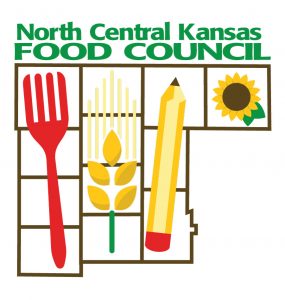
Tootleville Park is an important part of the City of Miltonvale.
A park is a vital part of many communities. Miltonvale, a town of just over 500 people located south of U.S. Hwy 24, has made many park improvements over the years. Those efforts received a boost when the community was awarded Kansas Department of Commerce Community Development Block Grant (CDBG) funds under the 2015 Special Round category.
The $350,000 award, coupled with more than $35,500 in local contributions, allowed the city to complete a major park improvement project. This, however, was not the first time the community invested in its park. Approximately 10 years ago volunteers built the “Tootleville Playground” area with the help of more than $100,000 in donated funds. A disc golf course came later. It has become a top course in Kansas with an annual tournament. The city has also renovated a Works Progress Administration (WPA) fountain and added a RV Park using foundation and other local funding sources. The CDBG project helped the city replace band shell seating, construct accessible walkways, construct a veteran’s memorial, improve drainage, install fencing for an existing volleyball court, and construct a picnic shelter and a parking area.
According to NCRPC Assistant Director Emily Benedick, Miltonvale’s approach to solve a community need is still relevant even though the CDBG Special Round of funding no longer exists.
“They may be a small rural community, but they find ways to continuously make improvements throughout the city in order to ensure the best quality of life possible for their residents,” Benedick said. “When cities are able to prove that they can help themselves with or without grant funding, it only improves their chances of receiving grant funds.”
According to Miltonvale City Clerk Darla Bebber, the park is a hub of community activity. This summer it is the location of three free movies and a farmer’s market. It is also popular for weddings, photography, disc golf tournaments, festivals, and RV Park.
“The community is proud of the park and utilizes it extensively as well as out of town visitors,” Bebber said.
Miltonvale is home to a long list of WPA structures, many of which are located in the park. The city plans to continue its park improvements.
“On the horizon we hope to renovate the scout cabin and grill and clean up the creek wall area (all WPA structures). It’s all a part of our history and the hard working people that made this park come to life,” Bebber said. “We are also working on markers that will give the history of the park, Miltonvale and the WPA projects.”
There are many great things happening in North Central Kansas communities. Periodically we plan to feature projects from around the region to share ways communities have solved challenges. To view more Project Spotlights, visit https://www.ncrpc.org/tag/project-spotlight/.
This article appeared in the July 2018 NCRPC Newsletter.
 NCK-WiFi, the free Internet service provided by Cunningham Telephone & Cable (CTC) and NCKCN, continues to expand throughout North Central Kansas.
NCK-WiFi, the free Internet service provided by Cunningham Telephone & Cable (CTC) and NCKCN, continues to expand throughout North Central Kansas.





 fills accept E-waste, some are limited on how much and what types they can accept. McMillan suggests checking with your local landfill on its E-waste policies.
fills accept E-waste, some are limited on how much and what types they can accept. McMillan suggests checking with your local landfill on its E-waste policies.
 The NCKFC will begin surveying in June. The survey will help determine local food trends in consumption and availability of health food choices. It will be available online and through paper copies in public offices around the region. Focus groups will begin this summer and continue through the fall.
The NCKFC will begin surveying in June. The survey will help determine local food trends in consumption and availability of health food choices. It will be available online and through paper copies in public offices around the region. Focus groups will begin this summer and continue through the fall.